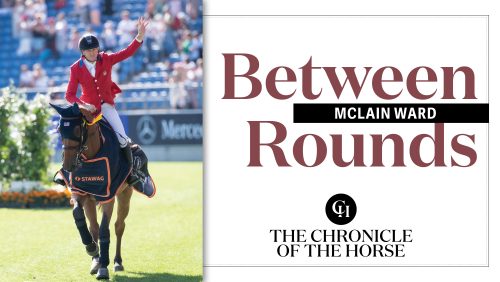Anyone connected with a horse can now be held responsible for prohibited substances—but the USEF process could still go further.
A January announcement from the U.S. Equestrian Federation Hearing Panel suspending both the trainer (Larry Glefke) and the rider (Kelley Farmer) for use of prohibited substances is a step forward to eliminating drug abuse in competition horses. The days of restricting responsibility for drug offenses to the person signing as trainer on the entry blank are over.
The practice of holding the signing trainer responsible began with the American Horse Shows Association. As equestrian sport developed, the support staff for trainers and riders grew. More people are involved in getting a horse to the ring than ever before, and more opportunities exist today for a horse to be given prohibited substances before entering the ring.
The Fédération Equestre Internationale has led the way in holding athletes and their support staff liable if involved with horse doping. Under the FEI system, the person automatically responsible is the rider, driver, vaulter or handler who competes with the horse. This person will be initially charged and suspended if a horse tests positive. But it doesn’t stop there. If the evidence obtained by the FEI from its investigation, or presented by the athlete, shows that other individuals had knowledge or participated in the doping offense, charges will be brought against them as well. The same array of penalties exists for support staff as for the athlete.
The prior USEF practice of holding only the signing trainer accountable was not only outdated, but it also created a legal loophole for unscrupulous trainers. By having a person other than the trainer sign the entry blank, the trainer could administer prohibited substances and then avoid being charged and suspended for a medication violation. This allowed dishonest trainers to use medications to compete unfairly against others while preventing their businesses from being disrupted if one of their horses got caught with a positive test. The new USEF policy will help greatly to prevent this abuse. However, it is insufficient alone.
Under the FEI anti-doping rules, a positive test for a prohibited substance in a horse creates an automatic suspension under a strict enforcement system. The two-year suspension for the use of banned substances is a preset penalty. The only way the athlete can potentially reduce the penalty is to first show how the illegal substance got into the horse. If the athlete can show how the substance entered the horse, she must then show she was not at fault. Provided the method of entry into the horse has been shown, the FEI Hearing Panel can then assess the degree of fault of the athlete. If the panel finds that the athlete had no fault or no significant fault, the FEI rules allow the penalties to be eliminated or reduced respectively. Requiring the athlete to show how the substance entered the horse forces the identification of other individuals who are responsible, including members of their support staff.
ADVERTISEMENT
The USEF has made an important policy change that will help protect our horses from doping abuse by holding responsible any individual with control over a horse that tests positive. However, the current USEF hearing and penalty process does not go far enough because it does not create enough pressure on those charged to identify other culpable persons. In fact, the USEF hearing process has it somewhat backwards. The USEF penalties for drug violations are not automatically assessed after a positive test but only determined after a hearing; the FEI penalties for drug violations are known in advance and enforced before the hearing. They can only be lifted or mitigated if the athlete first shows how the drug got into the horse. This allows identification and penalization of other responsible persons who would otherwise escape their responsibility. With rare exception, the athlete is in the best position to know what really happened.
The recent move by the USEF to extend responsibility for drug charges beyond just the signing trainer is a crucial step in encouraging fair play, but it is just a first step. Whether implementing a system similar to that of the FEI or creating an entirely new enforcement process for the USEF, there remains more to do to eliminate doping for the betterment and enjoyment of equestrian sport and the welfare of our horses.
Armand Leone of Leone Equestrian Law LLC is a business professional with expertise in health care, equestrian sports and law. An equestrian athlete dedicated to fair play, safe sport and clean competition, Leone served as a director on the board of the U.S. Equestrian Federation and was USEF vice president of international high performance programs for many years. He served on USEF and U.S. Hunter Jumper Association special task forces on governance, safety, drugs and medications, trainer certification, and coach selection.
Leone is co-owner at his family’s Ri-Arm Farm in Oakland N.J., where he still rides and trains. He competed in FEI World Cup Finals and Nations Cups. He is a graduate of the Columbia Business School in New York and the Columbia University School of Law. He received his M.D. from New York Medical College and his B.A. from the University of Virginia.
Leone Equestrian Law LLC provides legal services and consultation for equestrian professionals. For more information, visit equestriancounsel.com or follow them on Facebook at facebook.com/leoneequestrianlaw.















